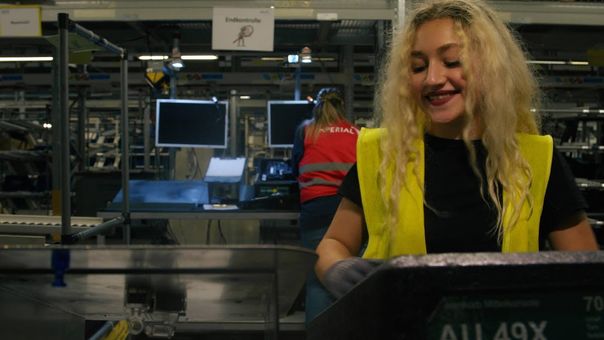Oh Lord, won’t you buy me…?
Jonas Heldt’s AUTOMOTIVE touches on the notion of desire fading away, yielding to functionality and utilitarianism
br>
By Rodrigo Garay

© Jonas Heldt
It is an era of huge technological advancements, and Germany is getting ready to incorporate more and more automated machinery to substitute at least 10% of all jobs in the car industry. Jonas Heldt’s AUTOMOTIVE (Germany), screened in the Berlinale’s Perspektive Deutsches Kino’s program, features two women with opposing relationships to the Audi factory’s ecosystem in the midst of a fuel crisis. One’s lifestyle entirely depends on the other’s decisions - and they don’t even know each other. Their lives are a clear representation of a world torn between two eternal forces: labor and desire.
Desire, your name is Sedanur: You’re a twenty-year-old factory worker who swears would never be able to work in an office because it’s boring. You’re loquacious and happy. Naive and full of hope. One day you’d like to buy Janis Joplin’s dream car, or have your own place to feel successful. For someone who seems to really enjoy the taxing hours spent in front of an assembly line without even having a proper contract, you’re barely ready to face the change to come in the European industrial environment. Machines are taking over. You’re about to be left with nothing but your charm and your laughter and your family because your job doesn’t need you anymore.
Labor, your name is Eva: You’re a thirty-three-year-old headhunter looking for the sharpest candidate to complete automation in your factory. You’re tireless and effective. Focused and strong-willed. You don’t mind working in an office, won’t even bother to take your AirPods off when you’re in frame for an interview. You get things done so that when your position becomes disposable, you’ll already be swimming in money. Labor nurtures a system that never stops, and your hand is the tool that enforces its evolution.
As any marketing campaign or Marxist psychoanalyst would tell you, desire plays a key part in the capitalist structure. Were it not for people like Sedanur and their constant thirst for new cars, clothes and pretty toys, the big architects like Eva would have nothing to do. Through split sequences and very obvious comparisons of the two characters’ lifestyles, the documentary showcases how the role of human emotion is being pressured into an uncomfortable spot for these two women’s generation. One plays along, the other is the odd one out. AUTOMOTIVE touches on the notion of desire fading away, ceding its way to total functionality and utilitarianism.
The movie also cheekily shows there was a time in which both desire and labor flowed more less together in harmony. In some of the most unexpected moments in an otherwise conventional and to-the-point slice-of-life documentary, the editing goes back in time to show archival footage from factory workers at the Ingolstadt Audi factory fifty or sixty years ago, well integrated in silly social interactions (like office exercise routines), and joyfully demonstrating a collective spirit. No such thing as robots or artificial intelligence back then.
The comparison with modern times is brutal. The smooth dolly shots in the film’s later parts, slowly sweeping past spaces populated by robots minding their own business, serve as an eerie reminder that cinema itself is the work of a machine. The moving image is before us thanks to the workings of a projector—not exactly the craft of humans anymore. For a brief moment during my watch of AUTOMOTIVE, I saw myself at the mercy of the automaton, too.

